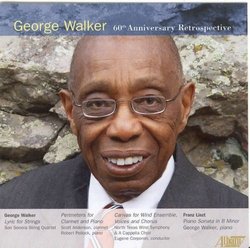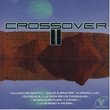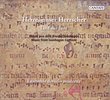| All Artists: George Walker Title: George Walker - 60th Anniversary Retrospective Members Wishing: 0 Total Copies: 0 Label: Albany Records Release Date: 11/1/2006 Genres: New Age, Classical Styles: Instrumental, Opera & Classical Vocal, Chamber Music, Forms & Genres, Sonatas, Historical Periods, Classical (c.1770-1830), Romantic (c.1820-1910) Number of Discs: 1 SwapaCD Credits: 1 UPC: 034061088028 |
Search - George Walker :: George Walker - 60th Anniversary Retrospective
 | George Walker George Walker - 60th Anniversary Retrospective Genres: New Age, Classical
In 1945 George Walker became the first African-American graduate of the renowned Curtis Institute of Music. The centerpiece of his graduation recital was the Liszt Sonata in b-minor, newly recorded here as an anniversary c... more » |
Larger Image |
CD DetailsSynopsis
Product Description In 1945 George Walker became the first African-American graduate of the renowned Curtis Institute of Music. The centerpiece of his graduation recital was the Liszt Sonata in b-minor, newly recorded here as an anniversary celebration. Along with this work are representative examples of Walker s art as a highly expressive, original composer who writes in a tough, sinewy modern style but whose works reveal a distinct, American lyricism. George Theophilus Walker was born in Washington. His early years were notable for his performances in New York s Town Hall, and his appearances with Eugene Ormandy and the Philadelphia Orchestra in the Rachmaninov Piano Concerto No. 3. His first composition, the String Quartet No. 1, appeared in 1946 and the second movement, Lyric for Strings, is performed on this new CD. Walker has composed over 90 works for orchestra, chamber orchestra, piano, strings, voice and solo instruments. In 1996 he was the first African-American recipient of the Pulitzer Prize for Music for Lilacs, for Voice and Orchestra. Walker is a true American treasure, and we are proud to release this latest disc in a series devoted to his compositions and performances from the piano repertoire (these can be heard on TROY 117, 136, 154, 252, 270, 411, 523 and 697). Similar CDs
|
CD ReviewsSome Excellent Music by Walker, and His Emotionally Satisfyi J Scott Morrison | Middlebury VT, USA | 01/27/2007 (4 out of 5 stars) "The bitter tone of the booklet notes for this retrospective CD of George Walker's music is unfortunate. There are ungracious comments about the music of Barber (that the Adagio for Strings is "simplistic") and Stravinsky (that his assertions about emotionality in music are "fatuous") that seem to be making an effort to advance the case for Walker's music. His music does not require these sorts of ad hominem attacks. Indeed there is some lovely stuff here.
Possibly his best-known work, 'Lyric for Strings', is played beautifully in its original version for string quartet; it is probably better known in its orchestral guise. The Son Sonora String Quartet play with mellifluous tones appropriate for this 6 1/2 minute lyrical outpouring. Included is Walker's own magnificent performance of the Liszt B Minor Piano Sonata, the work with which he made his Town Hall debut in 1945, a time when he was much better known as a pianist than as a composer. The CD information does not indicate when the current performance was recorded. Although not entirely note-perfect, with some over-pedaling and a slightly mushy recorded sound, this is nonetheless a heart-felt as well as technically adroit performance. One responds to the obvious love Walker has for this touchstone of the piano literature. I enjoyed it immensely. (In fact, I listened to it again immediately after my first hearing largely because I could feel how much of himself Walker puts into the performance. So many virtuosi perform the work primarily as a technical tour de force while Walker is responding to the musical and emotional values inherent in it.) There is a strange three-movement work from 2000 called 'Canvas for Wind Ensemble, Voices and Chorus' the middle movement of which is composed to an even stranger text written by Walker himself. The first movement, 'Extract I', is for instruments alone and is in Walker's expressionistic style, with fragmented motives appearing, being manipulated and then disappearing only to recur in a sort of arch-form construction. The second 'Extract' is for six speakers with designated voice types (soprano, tenor, etc.). The text is a collection of seemingly random and, for me, essentially meaningless fragments that include some extraordinarily ponderous prose, e.g., 'It can be said with some assurance, that may be perceived by some as arrogance, that if we are determined to obliterate the strata of inequity that victimizes the dispossessed, and if we repudiate the polarizing patterns embedded in sanctioned neglect ...' Frankly, I didn't get it. And then Extract III is a moving setting, for chorus and wind band, of Psalm 121 ('I will lift up mine eyes unto the hills'). Finally, there is a three-movement clarinet and piano work called 'Perimeters', performed nicely by Scott Anderson and Robert Pollock. It is in Walker's expressionistic style that makes a mosaic of short motives. Most interesting for me was the final movement that is highly contrapuntal and manages a kind of whimsicality that is winning. Both recorded sound and performances are all one could ask. Scott Morrison" |

 Track Listings (4) - Disc #1
Track Listings (4) - Disc #1



